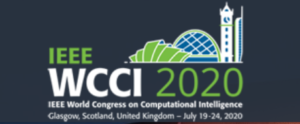2020 | IEEE WORLD CONGRESS ON COMPUTATIONAL INTELLIGENCE (WCCI)
2020 July 19 – 24
(originally scheduled Glasgow, UK)
Location: Virtual
The IEEE World Congress on Computational Intelligence (IEEE WCCI) is a technical event in the field of computational intelligence.
WCCI 2020 features the flagship conference of the Computational Intelligence Society: The 2020 International Joint Conference on Neural Networks (IJCNN 2020), the 2020 IEEE International Conference on Fuzzy Systems (FUZZ-IEEE 2020), and the 2020 IEEE Congress on Evolutionary Computation (IEEE CEC 2020) under one roof.
It encourages cross-fertilization of ideas among the three big areas and provides a forum for intellectuals from all over the world to discuss and present their research findings on computational intelligence. Read More.
Panel Sessions
Entrepreneurship Sessions
2020 July 19
REGISTER TODAY
IEEE Entrepreneurship Podcast | Conversations in Entrepreneurship, Machine Learning, and AI
Panel Discussion
The IEEE Entrepreneurship panel at IEEE WCCI 2020 will help foster growth in start-ups and small businesses using AI, machine learning, and computational intelligence as part of their core operating technologies.
While focused on broad geographic growth, the panel is specifically interested in helping companies in Region 8 at this flagship conference of the IEEE Computational Intelligence Society.
This IEEE Entrepreneurship panel will facilitate discussion on the difficulties of raising capital, providing solutions to the market, and help take the mystery out of making successful inroads in tech-driven entrepreneurship.
As companies innovate, their ability to implement new ideas and the speed at which they bring those ideas to market have become decisive factors to success or failure.
Innovation and the product development processes that drive it can help a company achieve success or suffer poor results.
In this session, presenters will reveal what factors cause startups/products to fail in the marketplace and share best practices and possibilities for improvement to achieve better results.
We will hear case studies into the various phases of innovation and product development and learn about the circumstances that contribute to the high and lows of engineering-driven entrepreneurship.
IEEE Entrepreneurship Program Overview
Speakers
Moderator
Detect and classify birds using sounds from 6000 hours of recorded audio | Amazon Web Services (AWS) Session
Pointblue conservation has undertaken a project called S2L – Soundscapes to Landscapes in collaboration with Sonoma State University which focuses on tracking bird species population and migration in Sonoma County CA. It involves deploying tiny recording devices to forests and backyards to collect and analyze the sounds of bird songs and identify the species.
Before AWS engagement, this relied on on-prem computing and signal processing algorithms with less of a focus on deep learning and GPUs. AWS AI/ML team engaged with Pointblue and showed them how the problem can be solved using computer vision and Amazon Sagemaker. We enabled them to build an end-to-end solution using serverless architecture on AWS. The project aims to publish several academic publications in the near future. As a result of this engagement, we are working with them on many fronts including getting them to be data providers under AWS open data set program.
Speakers
-
Justin Wilfred | Amazon Web Services
-
Raj Kadiyala | Amazon Web Services
Participants will get $1,000.00 in AWS credit to experiment and build their products on AWS. Learn More.
Open Source AI Model for COVID-19 CT Diagnostics and Prognosis | Amazon Web Services (AWS) Session
Vancouver General Hospital radiologists began looking into the feasibility of developing an AI model in January 2020, focusing on analyzing CT scans of CoVID-19 infected patients. The goal became to empower radiologists and provide metrics and statistical information about the infection that can’t normally be assessed by the human eye alone.
They built this model to be open-source so that centers around the world can continue development on their patient data and further improve the performance of the model, as well as come back and share their findings of the model output correlated with real-life results of PCR testing and morbidity rates. Fostering an open-source community and mentality around treating this illness may be the fastest and safest way to cross the patient-privacy barrier and foster enhanced collaboration between sites around the world.
Speakers
-
Paolo Emilio Barbano | Amazon Web Services
-
William Parker | Vancouver General Hospital
-
Keegan Lensink | University of British Columbia














